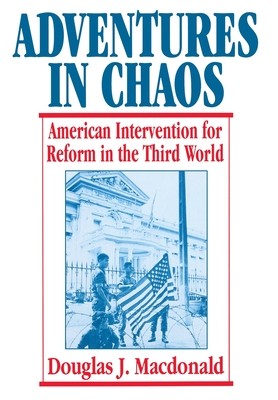
- We will send in 10–14 business days.
- Author: Douglas J MacDonald
- Publisher: Harvard University Press
- Year: 1992
- ISBN-10: 0674005775
- ISBN-13: 9780674005778
- Format: 16.3 x 24.4 x 2.4 cm, hardcover
- Language: English
- SAVE -10% with code: EXTRA
Reviews
Description
Can--or should--the United States try to promote reform in client states in the Third World? This question, which reverberates through American foreign policy, is at the heart of Adventures in Chaos. A faltering friendly state, in danger of falling to hostile forces, presents the U.S. with three options: withdraw, bolster the existing government, or try to reform it. Douglas Macdonald defines the circumstances that call these policy options into play, combining an analysis of domestic politics in the U. S., cognitive theories of decision making, and theories of power relations drawn from sociology, economics, and political science.
He examines the conditions that promote the reformist option and then explores strategies for improving the success of reformist intervention in the future. In order to identify problems in this policy--and to propose solutions--Macdonald focuses on three case studies of reformist intervention in Asia: China, 1946-1948; the Philippines, 1950-1953; and Vietnam, 1961-1963. Striking similarities in these cases suggest that such policy dilemmas are a function of the global role played by the U.S., especially during the Cold War. Though this role is changing, Macdonald foresees future applications for the lessons his study offers.
A challenge to the conventional wisdom on reformist intervention, Adventures in Chaos--through extensive archival research--displays a theoretical and historical depth often lacking in treatments of the subject.
EXTRA 10 % discount with code: EXTRA
The promotion ends in 19d.06:16:27
The discount code is valid when purchasing from 10 €. Discounts do not stack.
- Author: Douglas J MacDonald
- Publisher: Harvard University Press
- Year: 1992
- ISBN-10: 0674005775
- ISBN-13: 9780674005778
- Format: 16.3 x 24.4 x 2.4 cm, hardcover
- Language: English English
Can--or should--the United States try to promote reform in client states in the Third World? This question, which reverberates through American foreign policy, is at the heart of Adventures in Chaos. A faltering friendly state, in danger of falling to hostile forces, presents the U.S. with three options: withdraw, bolster the existing government, or try to reform it. Douglas Macdonald defines the circumstances that call these policy options into play, combining an analysis of domestic politics in the U. S., cognitive theories of decision making, and theories of power relations drawn from sociology, economics, and political science.
He examines the conditions that promote the reformist option and then explores strategies for improving the success of reformist intervention in the future. In order to identify problems in this policy--and to propose solutions--Macdonald focuses on three case studies of reformist intervention in Asia: China, 1946-1948; the Philippines, 1950-1953; and Vietnam, 1961-1963. Striking similarities in these cases suggest that such policy dilemmas are a function of the global role played by the U.S., especially during the Cold War. Though this role is changing, Macdonald foresees future applications for the lessons his study offers.
A challenge to the conventional wisdom on reformist intervention, Adventures in Chaos--through extensive archival research--displays a theoretical and historical depth often lacking in treatments of the subject.


Reviews